Entrepreneurship, Enterprise and Innovation
VerifiedAdded on 2023/01/18
|12
|2122
|91
AI Summary
This document explores the theories and practice of entrepreneurship, enterprise, and innovation. It discusses the characteristics and personalities of successful entrepreneurs and how students can evaluate their own potential. It also examines the internal and external factors that impact entrepreneurial culture and the process of starting a business.
Contribute Materials
Your contribution can guide someone’s learning journey. Share your
documents today.
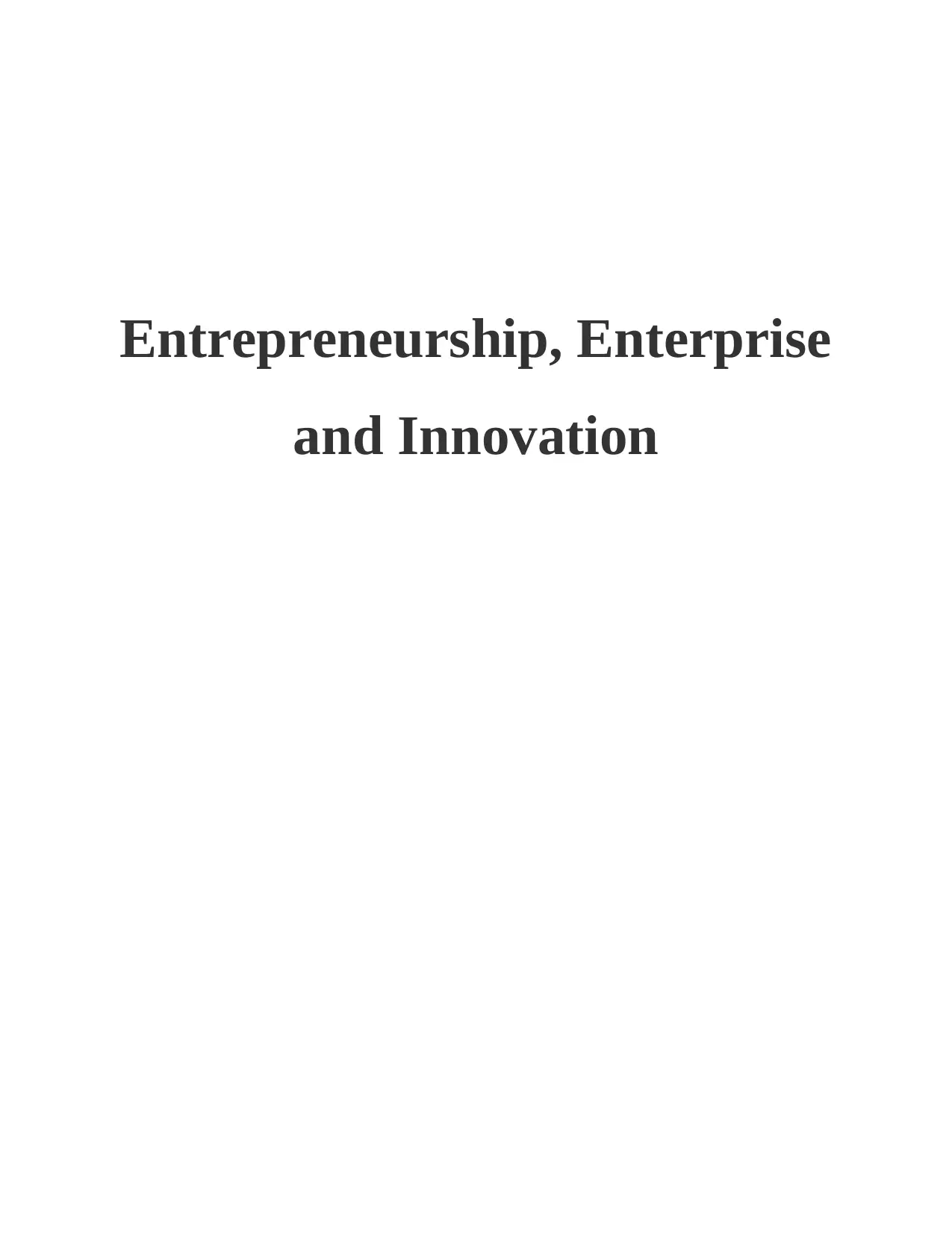
Entrepreneurship, Enterprise
and Innovation
and Innovation
Secure Best Marks with AI Grader
Need help grading? Try our AI Grader for instant feedback on your assignments.
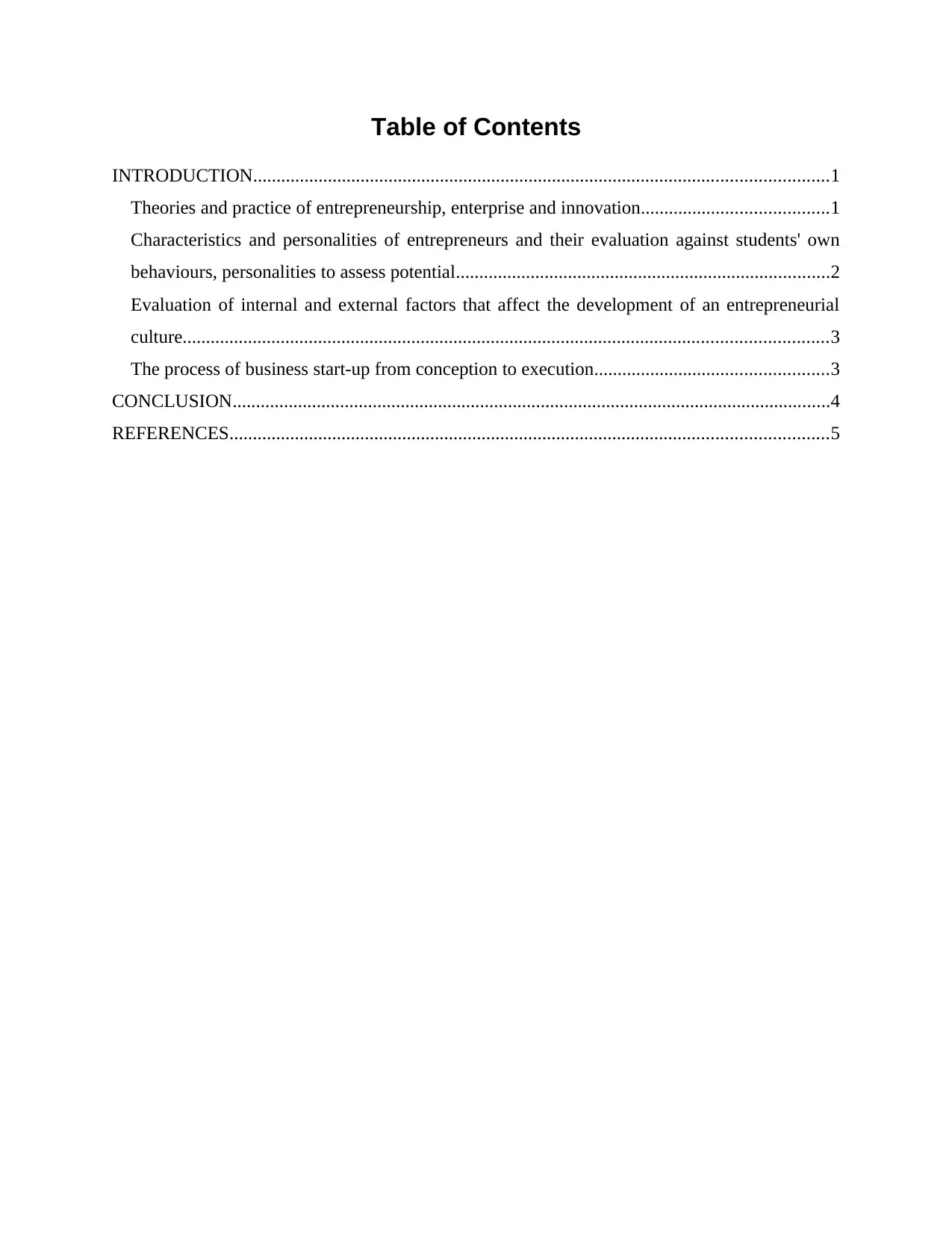
Table of Contents
INTRODUCTION...........................................................................................................................1
Theories and practice of entrepreneurship, enterprise and innovation........................................1
Characteristics and personalities of entrepreneurs and their evaluation against students' own
behaviours, personalities to assess potential................................................................................2
Evaluation of internal and external factors that affect the development of an entrepreneurial
culture..........................................................................................................................................3
The process of business start-up from conception to execution..................................................3
CONCLUSION................................................................................................................................4
REFERENCES................................................................................................................................5
INTRODUCTION...........................................................................................................................1
Theories and practice of entrepreneurship, enterprise and innovation........................................1
Characteristics and personalities of entrepreneurs and their evaluation against students' own
behaviours, personalities to assess potential................................................................................2
Evaluation of internal and external factors that affect the development of an entrepreneurial
culture..........................................................................................................................................3
The process of business start-up from conception to execution..................................................3
CONCLUSION................................................................................................................................4
REFERENCES................................................................................................................................5
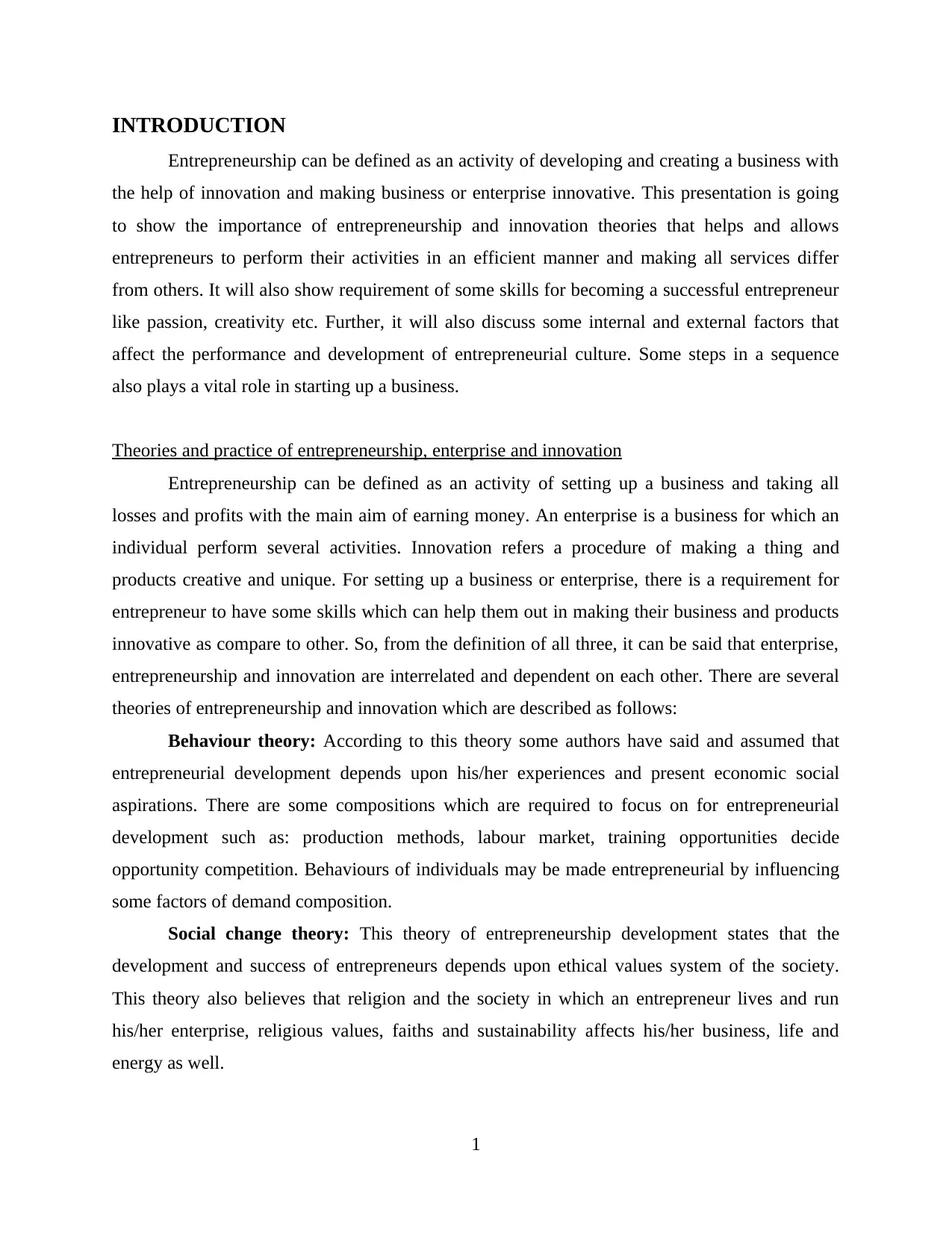
INTRODUCTION
Entrepreneurship can be defined as an activity of developing and creating a business with
the help of innovation and making business or enterprise innovative. This presentation is going
to show the importance of entrepreneurship and innovation theories that helps and allows
entrepreneurs to perform their activities in an efficient manner and making all services differ
from others. It will also show requirement of some skills for becoming a successful entrepreneur
like passion, creativity etc. Further, it will also discuss some internal and external factors that
affect the performance and development of entrepreneurial culture. Some steps in a sequence
also plays a vital role in starting up a business.
Theories and practice of entrepreneurship, enterprise and innovation
Entrepreneurship can be defined as an activity of setting up a business and taking all
losses and profits with the main aim of earning money. An enterprise is a business for which an
individual perform several activities. Innovation refers a procedure of making a thing and
products creative and unique. For setting up a business or enterprise, there is a requirement for
entrepreneur to have some skills which can help them out in making their business and products
innovative as compare to other. So, from the definition of all three, it can be said that enterprise,
entrepreneurship and innovation are interrelated and dependent on each other. There are several
theories of entrepreneurship and innovation which are described as follows:
Behaviour theory: According to this theory some authors have said and assumed that
entrepreneurial development depends upon his/her experiences and present economic social
aspirations. There are some compositions which are required to focus on for entrepreneurial
development such as: production methods, labour market, training opportunities decide
opportunity competition. Behaviours of individuals may be made entrepreneurial by influencing
some factors of demand composition.
Social change theory: This theory of entrepreneurship development states that the
development and success of entrepreneurs depends upon ethical values system of the society.
This theory also believes that religion and the society in which an entrepreneur lives and run
his/her enterprise, religious values, faiths and sustainability affects his/her business, life and
energy as well.
1
Entrepreneurship can be defined as an activity of developing and creating a business with
the help of innovation and making business or enterprise innovative. This presentation is going
to show the importance of entrepreneurship and innovation theories that helps and allows
entrepreneurs to perform their activities in an efficient manner and making all services differ
from others. It will also show requirement of some skills for becoming a successful entrepreneur
like passion, creativity etc. Further, it will also discuss some internal and external factors that
affect the performance and development of entrepreneurial culture. Some steps in a sequence
also plays a vital role in starting up a business.
Theories and practice of entrepreneurship, enterprise and innovation
Entrepreneurship can be defined as an activity of setting up a business and taking all
losses and profits with the main aim of earning money. An enterprise is a business for which an
individual perform several activities. Innovation refers a procedure of making a thing and
products creative and unique. For setting up a business or enterprise, there is a requirement for
entrepreneur to have some skills which can help them out in making their business and products
innovative as compare to other. So, from the definition of all three, it can be said that enterprise,
entrepreneurship and innovation are interrelated and dependent on each other. There are several
theories of entrepreneurship and innovation which are described as follows:
Behaviour theory: According to this theory some authors have said and assumed that
entrepreneurial development depends upon his/her experiences and present economic social
aspirations. There are some compositions which are required to focus on for entrepreneurial
development such as: production methods, labour market, training opportunities decide
opportunity competition. Behaviours of individuals may be made entrepreneurial by influencing
some factors of demand composition.
Social change theory: This theory of entrepreneurship development states that the
development and success of entrepreneurs depends upon ethical values system of the society.
This theory also believes that religion and the society in which an entrepreneur lives and run
his/her enterprise, religious values, faiths and sustainability affects his/her business, life and
energy as well.
1
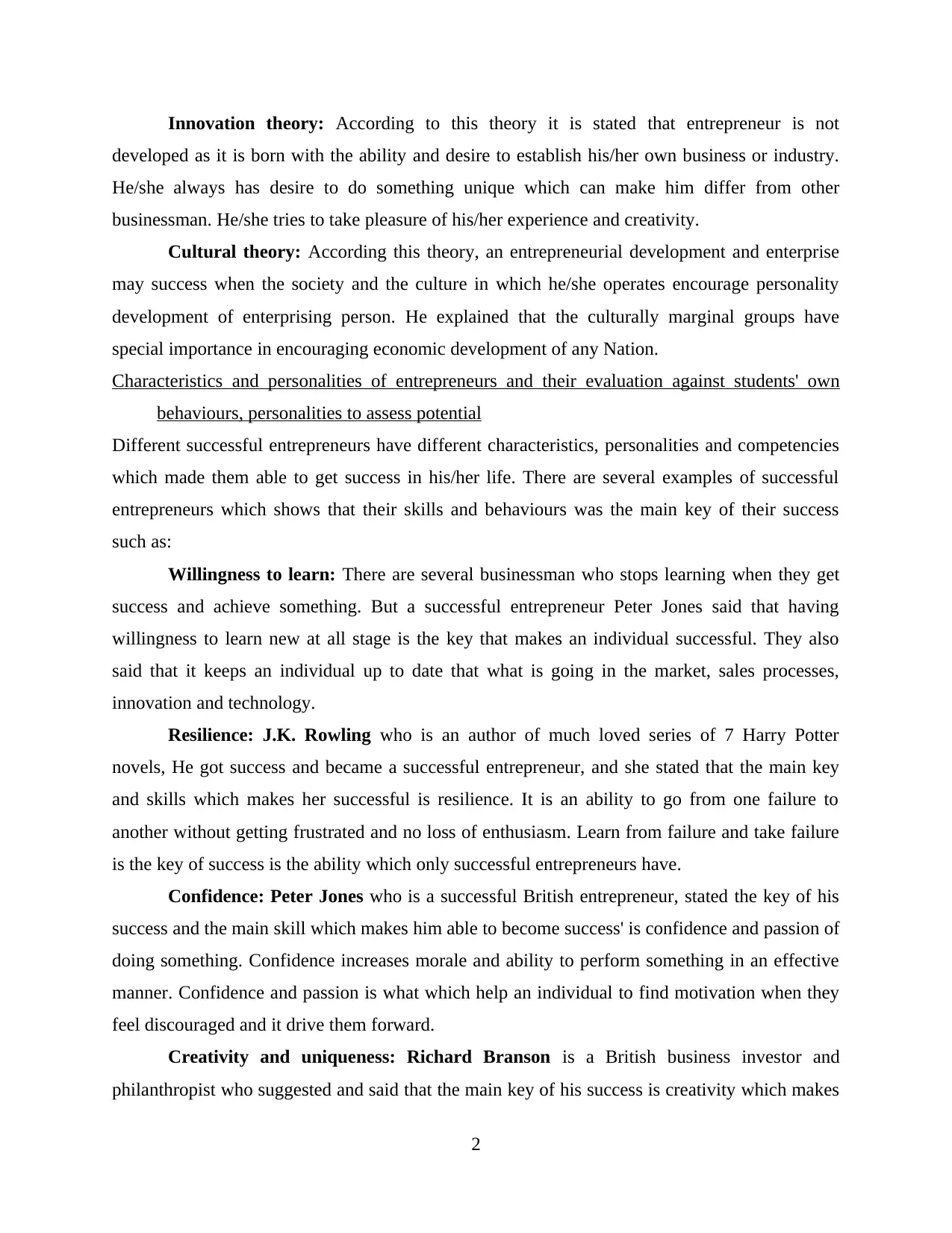
Innovation theory: According to this theory it is stated that entrepreneur is not
developed as it is born with the ability and desire to establish his/her own business or industry.
He/she always has desire to do something unique which can make him differ from other
businessman. He/she tries to take pleasure of his/her experience and creativity.
Cultural theory: According this theory, an entrepreneurial development and enterprise
may success when the society and the culture in which he/she operates encourage personality
development of enterprising person. He explained that the culturally marginal groups have
special importance in encouraging economic development of any Nation.
Characteristics and personalities of entrepreneurs and their evaluation against students' own
behaviours, personalities to assess potential
Different successful entrepreneurs have different characteristics, personalities and competencies
which made them able to get success in his/her life. There are several examples of successful
entrepreneurs which shows that their skills and behaviours was the main key of their success
such as:
Willingness to learn: There are several businessman who stops learning when they get
success and achieve something. But a successful entrepreneur Peter Jones said that having
willingness to learn new at all stage is the key that makes an individual successful. They also
said that it keeps an individual up to date that what is going in the market, sales processes,
innovation and technology.
Resilience: J.K. Rowling who is an author of much loved series of 7 Harry Potter
novels, He got success and became a successful entrepreneur, and she stated that the main key
and skills which makes her successful is resilience. It is an ability to go from one failure to
another without getting frustrated and no loss of enthusiasm. Learn from failure and take failure
is the key of success is the ability which only successful entrepreneurs have.
Confidence: Peter Jones who is a successful British entrepreneur, stated the key of his
success and the main skill which makes him able to become success' is confidence and passion of
doing something. Confidence increases morale and ability to perform something in an effective
manner. Confidence and passion is what which help an individual to find motivation when they
feel discouraged and it drive them forward.
Creativity and uniqueness: Richard Branson is a British business investor and
philanthropist who suggested and said that the main key of his success is creativity which makes
2
developed as it is born with the ability and desire to establish his/her own business or industry.
He/she always has desire to do something unique which can make him differ from other
businessman. He/she tries to take pleasure of his/her experience and creativity.
Cultural theory: According this theory, an entrepreneurial development and enterprise
may success when the society and the culture in which he/she operates encourage personality
development of enterprising person. He explained that the culturally marginal groups have
special importance in encouraging economic development of any Nation.
Characteristics and personalities of entrepreneurs and their evaluation against students' own
behaviours, personalities to assess potential
Different successful entrepreneurs have different characteristics, personalities and competencies
which made them able to get success in his/her life. There are several examples of successful
entrepreneurs which shows that their skills and behaviours was the main key of their success
such as:
Willingness to learn: There are several businessman who stops learning when they get
success and achieve something. But a successful entrepreneur Peter Jones said that having
willingness to learn new at all stage is the key that makes an individual successful. They also
said that it keeps an individual up to date that what is going in the market, sales processes,
innovation and technology.
Resilience: J.K. Rowling who is an author of much loved series of 7 Harry Potter
novels, He got success and became a successful entrepreneur, and she stated that the main key
and skills which makes her successful is resilience. It is an ability to go from one failure to
another without getting frustrated and no loss of enthusiasm. Learn from failure and take failure
is the key of success is the ability which only successful entrepreneurs have.
Confidence: Peter Jones who is a successful British entrepreneur, stated the key of his
success and the main skill which makes him able to become success' is confidence and passion of
doing something. Confidence increases morale and ability to perform something in an effective
manner. Confidence and passion is what which help an individual to find motivation when they
feel discouraged and it drive them forward.
Creativity and uniqueness: Richard Branson is a British business investor and
philanthropist who suggested and said that the main key of his success is creativity which makes
2
Secure Best Marks with AI Grader
Need help grading? Try our AI Grader for instant feedback on your assignments.
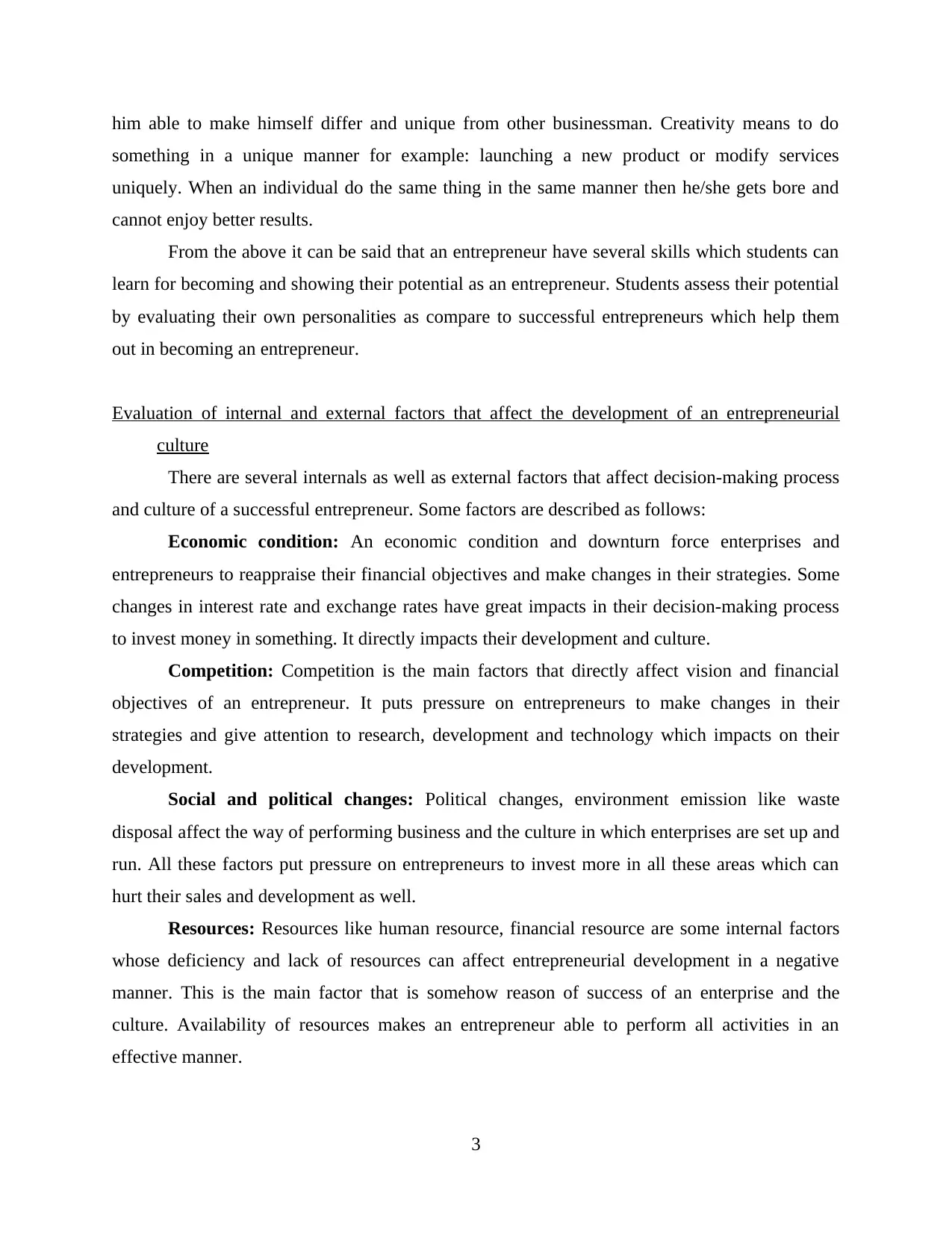
him able to make himself differ and unique from other businessman. Creativity means to do
something in a unique manner for example: launching a new product or modify services
uniquely. When an individual do the same thing in the same manner then he/she gets bore and
cannot enjoy better results.
From the above it can be said that an entrepreneur have several skills which students can
learn for becoming and showing their potential as an entrepreneur. Students assess their potential
by evaluating their own personalities as compare to successful entrepreneurs which help them
out in becoming an entrepreneur.
Evaluation of internal and external factors that affect the development of an entrepreneurial
culture
There are several internals as well as external factors that affect decision-making process
and culture of a successful entrepreneur. Some factors are described as follows:
Economic condition: An economic condition and downturn force enterprises and
entrepreneurs to reappraise their financial objectives and make changes in their strategies. Some
changes in interest rate and exchange rates have great impacts in their decision-making process
to invest money in something. It directly impacts their development and culture.
Competition: Competition is the main factors that directly affect vision and financial
objectives of an entrepreneur. It puts pressure on entrepreneurs to make changes in their
strategies and give attention to research, development and technology which impacts on their
development.
Social and political changes: Political changes, environment emission like waste
disposal affect the way of performing business and the culture in which enterprises are set up and
run. All these factors put pressure on entrepreneurs to invest more in all these areas which can
hurt their sales and development as well.
Resources: Resources like human resource, financial resource are some internal factors
whose deficiency and lack of resources can affect entrepreneurial development in a negative
manner. This is the main factor that is somehow reason of success of an enterprise and the
culture. Availability of resources makes an entrepreneur able to perform all activities in an
effective manner.
3
something in a unique manner for example: launching a new product or modify services
uniquely. When an individual do the same thing in the same manner then he/she gets bore and
cannot enjoy better results.
From the above it can be said that an entrepreneur have several skills which students can
learn for becoming and showing their potential as an entrepreneur. Students assess their potential
by evaluating their own personalities as compare to successful entrepreneurs which help them
out in becoming an entrepreneur.
Evaluation of internal and external factors that affect the development of an entrepreneurial
culture
There are several internals as well as external factors that affect decision-making process
and culture of a successful entrepreneur. Some factors are described as follows:
Economic condition: An economic condition and downturn force enterprises and
entrepreneurs to reappraise their financial objectives and make changes in their strategies. Some
changes in interest rate and exchange rates have great impacts in their decision-making process
to invest money in something. It directly impacts their development and culture.
Competition: Competition is the main factors that directly affect vision and financial
objectives of an entrepreneur. It puts pressure on entrepreneurs to make changes in their
strategies and give attention to research, development and technology which impacts on their
development.
Social and political changes: Political changes, environment emission like waste
disposal affect the way of performing business and the culture in which enterprises are set up and
run. All these factors put pressure on entrepreneurs to invest more in all these areas which can
hurt their sales and development as well.
Resources: Resources like human resource, financial resource are some internal factors
whose deficiency and lack of resources can affect entrepreneurial development in a negative
manner. This is the main factor that is somehow reason of success of an enterprise and the
culture. Availability of resources makes an entrepreneur able to perform all activities in an
effective manner.
3
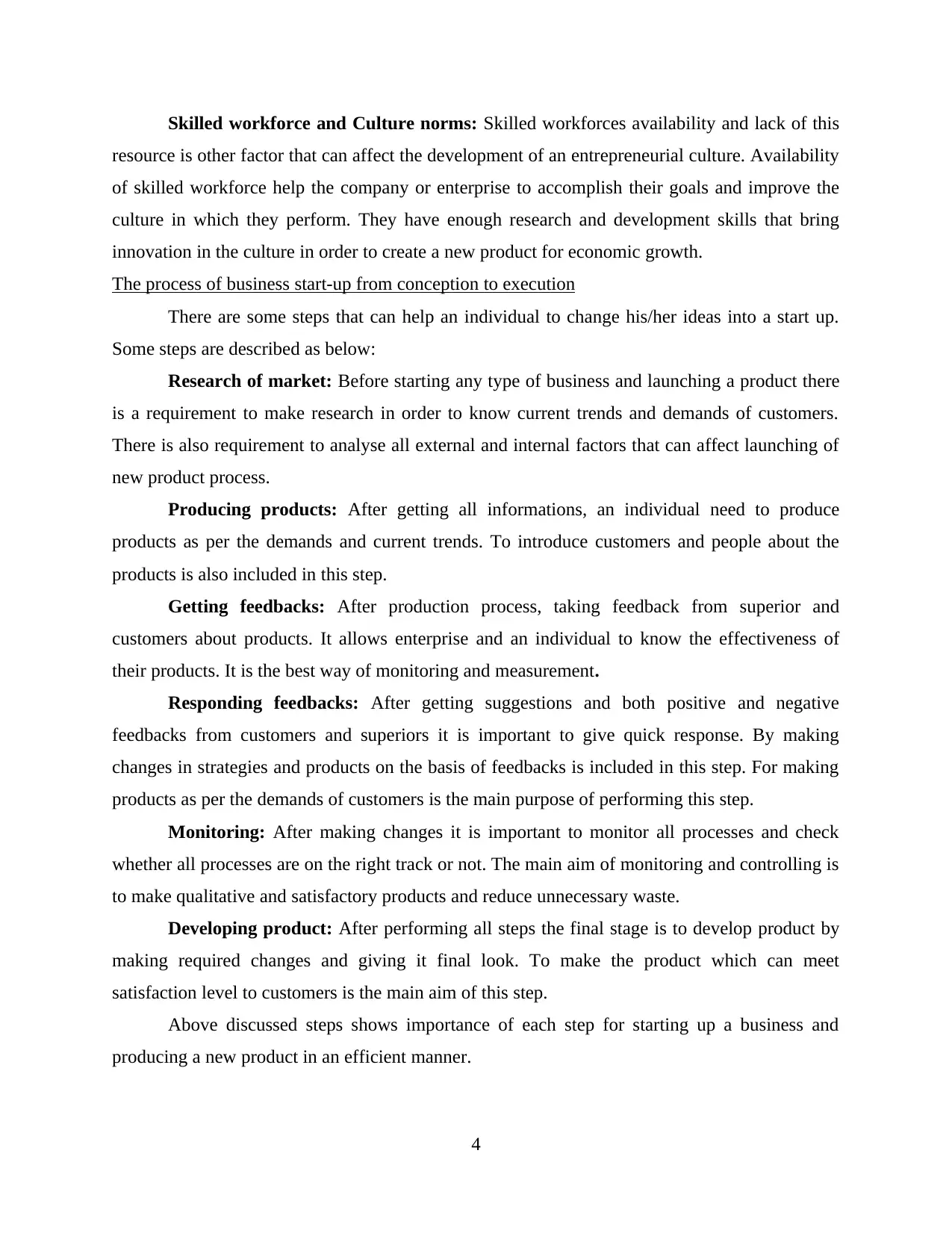
Skilled workforce and Culture norms: Skilled workforces availability and lack of this
resource is other factor that can affect the development of an entrepreneurial culture. Availability
of skilled workforce help the company or enterprise to accomplish their goals and improve the
culture in which they perform. They have enough research and development skills that bring
innovation in the culture in order to create a new product for economic growth.
The process of business start-up from conception to execution
There are some steps that can help an individual to change his/her ideas into a start up.
Some steps are described as below:
Research of market: Before starting any type of business and launching a product there
is a requirement to make research in order to know current trends and demands of customers.
There is also requirement to analyse all external and internal factors that can affect launching of
new product process.
Producing products: After getting all informations, an individual need to produce
products as per the demands and current trends. To introduce customers and people about the
products is also included in this step.
Getting feedbacks: After production process, taking feedback from superior and
customers about products. It allows enterprise and an individual to know the effectiveness of
their products. It is the best way of monitoring and measurement.
Responding feedbacks: After getting suggestions and both positive and negative
feedbacks from customers and superiors it is important to give quick response. By making
changes in strategies and products on the basis of feedbacks is included in this step. For making
products as per the demands of customers is the main purpose of performing this step.
Monitoring: After making changes it is important to monitor all processes and check
whether all processes are on the right track or not. The main aim of monitoring and controlling is
to make qualitative and satisfactory products and reduce unnecessary waste.
Developing product: After performing all steps the final stage is to develop product by
making required changes and giving it final look. To make the product which can meet
satisfaction level to customers is the main aim of this step.
Above discussed steps shows importance of each step for starting up a business and
producing a new product in an efficient manner.
4
resource is other factor that can affect the development of an entrepreneurial culture. Availability
of skilled workforce help the company or enterprise to accomplish their goals and improve the
culture in which they perform. They have enough research and development skills that bring
innovation in the culture in order to create a new product for economic growth.
The process of business start-up from conception to execution
There are some steps that can help an individual to change his/her ideas into a start up.
Some steps are described as below:
Research of market: Before starting any type of business and launching a product there
is a requirement to make research in order to know current trends and demands of customers.
There is also requirement to analyse all external and internal factors that can affect launching of
new product process.
Producing products: After getting all informations, an individual need to produce
products as per the demands and current trends. To introduce customers and people about the
products is also included in this step.
Getting feedbacks: After production process, taking feedback from superior and
customers about products. It allows enterprise and an individual to know the effectiveness of
their products. It is the best way of monitoring and measurement.
Responding feedbacks: After getting suggestions and both positive and negative
feedbacks from customers and superiors it is important to give quick response. By making
changes in strategies and products on the basis of feedbacks is included in this step. For making
products as per the demands of customers is the main purpose of performing this step.
Monitoring: After making changes it is important to monitor all processes and check
whether all processes are on the right track or not. The main aim of monitoring and controlling is
to make qualitative and satisfactory products and reduce unnecessary waste.
Developing product: After performing all steps the final stage is to develop product by
making required changes and giving it final look. To make the product which can meet
satisfaction level to customers is the main aim of this step.
Above discussed steps shows importance of each step for starting up a business and
producing a new product in an efficient manner.
4
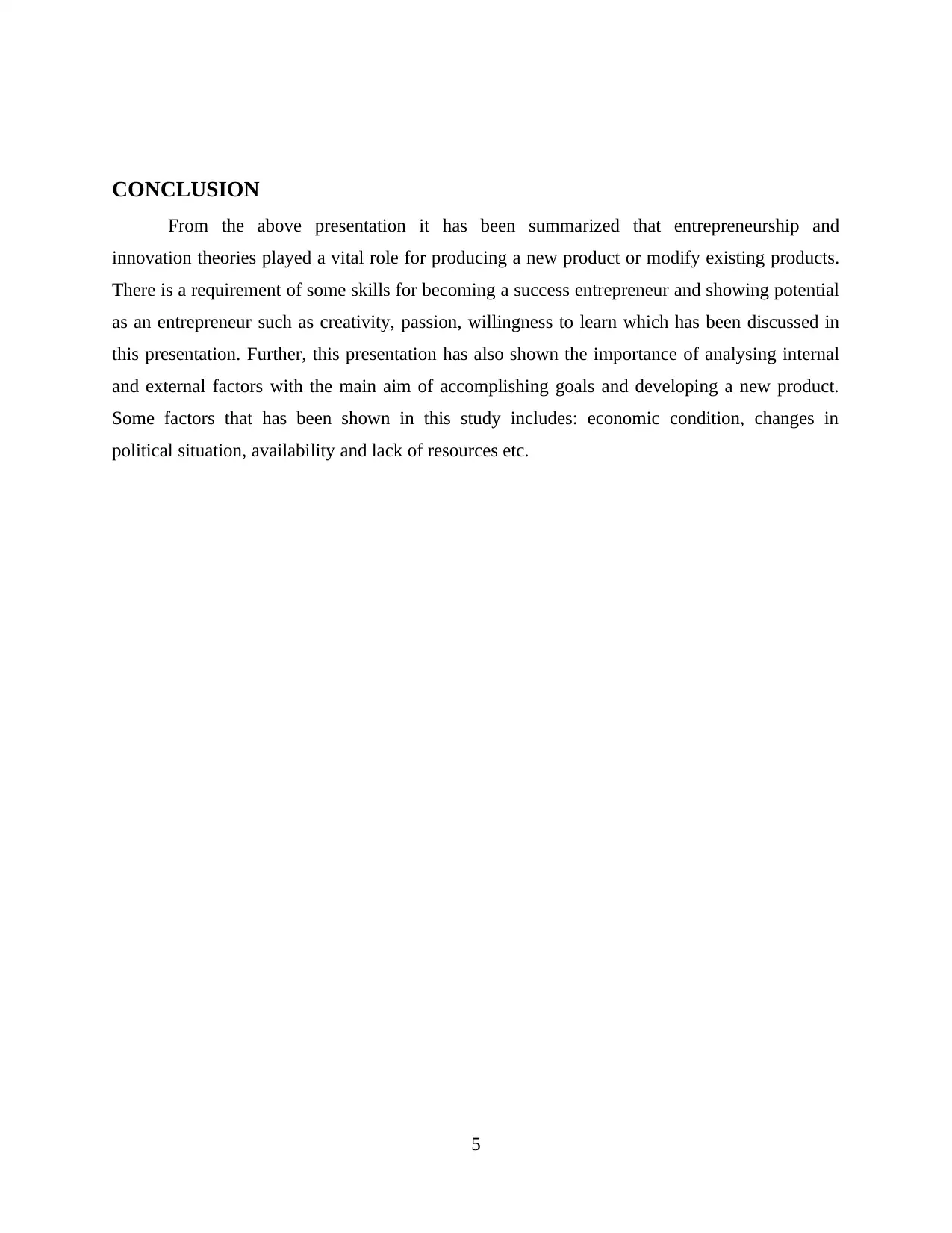
CONCLUSION
From the above presentation it has been summarized that entrepreneurship and
innovation theories played a vital role for producing a new product or modify existing products.
There is a requirement of some skills for becoming a success entrepreneur and showing potential
as an entrepreneur such as creativity, passion, willingness to learn which has been discussed in
this presentation. Further, this presentation has also shown the importance of analysing internal
and external factors with the main aim of accomplishing goals and developing a new product.
Some factors that has been shown in this study includes: economic condition, changes in
political situation, availability and lack of resources etc.
5
From the above presentation it has been summarized that entrepreneurship and
innovation theories played a vital role for producing a new product or modify existing products.
There is a requirement of some skills for becoming a success entrepreneur and showing potential
as an entrepreneur such as creativity, passion, willingness to learn which has been discussed in
this presentation. Further, this presentation has also shown the importance of analysing internal
and external factors with the main aim of accomplishing goals and developing a new product.
Some factors that has been shown in this study includes: economic condition, changes in
political situation, availability and lack of resources etc.
5
Paraphrase This Document
Need a fresh take? Get an instant paraphrase of this document with our AI Paraphraser
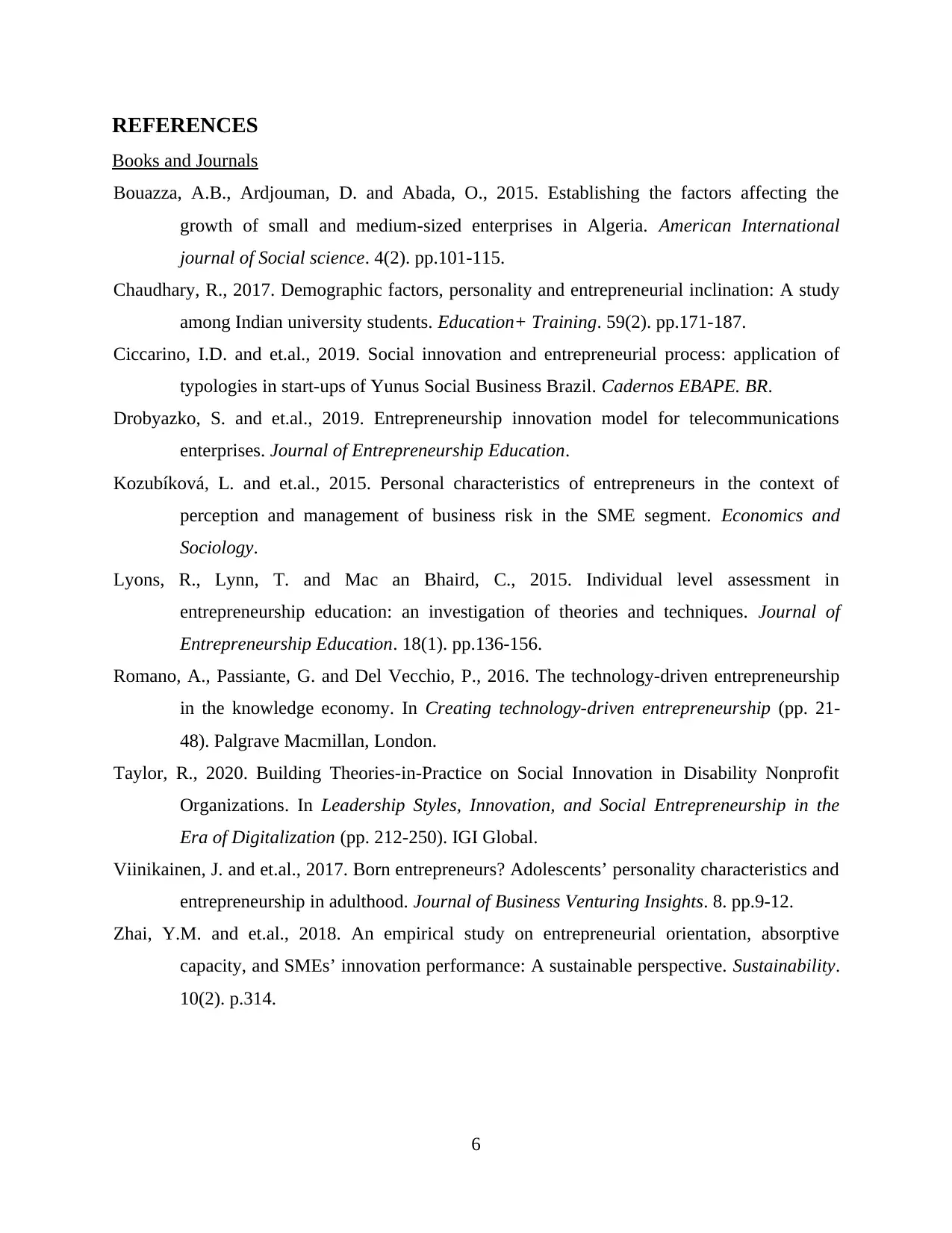
REFERENCES
Books and Journals
Bouazza, A.B., Ardjouman, D. and Abada, O., 2015. Establishing the factors affecting the
growth of small and medium-sized enterprises in Algeria. American International
journal of Social science. 4(2). pp.101-115.
Chaudhary, R., 2017. Demographic factors, personality and entrepreneurial inclination: A study
among Indian university students. Education+ Training. 59(2). pp.171-187.
Ciccarino, I.D. and et.al., 2019. Social innovation and entrepreneurial process: application of
typologies in start-ups of Yunus Social Business Brazil. Cadernos EBAPE. BR.
Drobyazko, S. and et.al., 2019. Entrepreneurship innovation model for telecommunications
enterprises. Journal of Entrepreneurship Education.
Kozubíková, L. and et.al., 2015. Personal characteristics of entrepreneurs in the context of
perception and management of business risk in the SME segment. Economics and
Sociology.
Lyons, R., Lynn, T. and Mac an Bhaird, C., 2015. Individual level assessment in
entrepreneurship education: an investigation of theories and techniques. Journal of
Entrepreneurship Education. 18(1). pp.136-156.
Romano, A., Passiante, G. and Del Vecchio, P., 2016. The technology-driven entrepreneurship
in the knowledge economy. In Creating technology-driven entrepreneurship (pp. 21-
48). Palgrave Macmillan, London.
Taylor, R., 2020. Building Theories-in-Practice on Social Innovation in Disability Nonprofit
Organizations. In Leadership Styles, Innovation, and Social Entrepreneurship in the
Era of Digitalization (pp. 212-250). IGI Global.
Viinikainen, J. and et.al., 2017. Born entrepreneurs? Adolescents’ personality characteristics and
entrepreneurship in adulthood. Journal of Business Venturing Insights. 8. pp.9-12.
Zhai, Y.M. and et.al., 2018. An empirical study on entrepreneurial orientation, absorptive
capacity, and SMEs’ innovation performance: A sustainable perspective. Sustainability.
10(2). p.314.
6
Books and Journals
Bouazza, A.B., Ardjouman, D. and Abada, O., 2015. Establishing the factors affecting the
growth of small and medium-sized enterprises in Algeria. American International
journal of Social science. 4(2). pp.101-115.
Chaudhary, R., 2017. Demographic factors, personality and entrepreneurial inclination: A study
among Indian university students. Education+ Training. 59(2). pp.171-187.
Ciccarino, I.D. and et.al., 2019. Social innovation and entrepreneurial process: application of
typologies in start-ups of Yunus Social Business Brazil. Cadernos EBAPE. BR.
Drobyazko, S. and et.al., 2019. Entrepreneurship innovation model for telecommunications
enterprises. Journal of Entrepreneurship Education.
Kozubíková, L. and et.al., 2015. Personal characteristics of entrepreneurs in the context of
perception and management of business risk in the SME segment. Economics and
Sociology.
Lyons, R., Lynn, T. and Mac an Bhaird, C., 2015. Individual level assessment in
entrepreneurship education: an investigation of theories and techniques. Journal of
Entrepreneurship Education. 18(1). pp.136-156.
Romano, A., Passiante, G. and Del Vecchio, P., 2016. The technology-driven entrepreneurship
in the knowledge economy. In Creating technology-driven entrepreneurship (pp. 21-
48). Palgrave Macmillan, London.
Taylor, R., 2020. Building Theories-in-Practice on Social Innovation in Disability Nonprofit
Organizations. In Leadership Styles, Innovation, and Social Entrepreneurship in the
Era of Digitalization (pp. 212-250). IGI Global.
Viinikainen, J. and et.al., 2017. Born entrepreneurs? Adolescents’ personality characteristics and
entrepreneurship in adulthood. Journal of Business Venturing Insights. 8. pp.9-12.
Zhai, Y.M. and et.al., 2018. An empirical study on entrepreneurial orientation, absorptive
capacity, and SMEs’ innovation performance: A sustainable perspective. Sustainability.
10(2). p.314.
6

7

8
Secure Best Marks with AI Grader
Need help grading? Try our AI Grader for instant feedback on your assignments.

9

10
1 out of 12
Related Documents
Your All-in-One AI-Powered Toolkit for Academic Success.
+13062052269
info@desklib.com
Available 24*7 on WhatsApp / Email
![[object Object]](/_next/static/media/star-bottom.7253800d.svg)
Unlock your academic potential
© 2024 | Zucol Services PVT LTD | All rights reserved.





